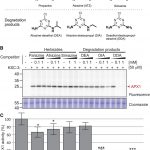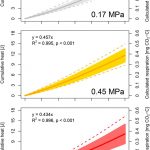Role of Polysaccharide Synthesis in Diatoms
Diatoms are a type of phytoplankton that account for ~20% of global primary production. Like all phytoplankton, they produce and store copious amounts of polysaccharides. More specifically, diatoms produce significant amounts of b-1,3 glucans, particularly chrysolaminarin. Mutualistic associations between bacteria and diatoms occur, and secreted polysaccharides are known to act as a carbon source for bacteria residing in the phycosphere. Polysaccharides can be excreted as extracellular polymeric substances (EPS), and EPS production rates are know n to change in response to environmental factors such as exposure to hydrocarbon pollution. The 2010 Deepwater Horizon oil spill exposed the Gulf of Mexico to ~4.9 million barrels of oil, after which extensive amounts of EPS in the form of “marine snow” were observed. The reasons behind such mass production of EPS in response to oil exposure is not completely known; however, the active secretion of mass amounts of polysaccharides would presumably have a profound influence on the microbial community during an oil spill, which in turn might influence the fate of the oil spilled. For instance, oil might be toxic to some microbes, and a carbon source for others. To understand the role of polysaccharides produced by diatoms, Kamalanathan et al. (10.1104/pp.19.00301) have investigated the response of the oil-sensitive diatom species Thalassiosira pseudonana with and without the chrysolaminarin synthesis inhibitor dichlorobenzonitrile and in the presence and absence of oil. They report that the inhibition of chrysolaminarin synthesis had a negative effect on the growth of T. pseudonana and intracellular monosaccharide accumulation, which in turn suppressed photosynthesis by feedback inhibition. In addition, by acting as a carbon reserve, chrysolaminarin helped in the recovery of T. pseudonana in the presence of oil. Inhibition of chrysolaminarin synthesis also influenced the bacterial community in the free-living fraction but not in the phycosphere. These findings demonstrate that chrysolaminarin synthesis plays an important role in the growth and survival of T. pseudonana in the presence of oil, and its inhibition can influence the composition and activity of the surrounding bacterial community.
n to change in response to environmental factors such as exposure to hydrocarbon pollution. The 2010 Deepwater Horizon oil spill exposed the Gulf of Mexico to ~4.9 million barrels of oil, after which extensive amounts of EPS in the form of “marine snow” were observed. The reasons behind such mass production of EPS in response to oil exposure is not completely known; however, the active secretion of mass amounts of polysaccharides would presumably have a profound influence on the microbial community during an oil spill, which in turn might influence the fate of the oil spilled. For instance, oil might be toxic to some microbes, and a carbon source for others. To understand the role of polysaccharides produced by diatoms, Kamalanathan et al. (10.1104/pp.19.00301) have investigated the response of the oil-sensitive diatom species Thalassiosira pseudonana with and without the chrysolaminarin synthesis inhibitor dichlorobenzonitrile and in the presence and absence of oil. They report that the inhibition of chrysolaminarin synthesis had a negative effect on the growth of T. pseudonana and intracellular monosaccharide accumulation, which in turn suppressed photosynthesis by feedback inhibition. In addition, by acting as a carbon reserve, chrysolaminarin helped in the recovery of T. pseudonana in the presence of oil. Inhibition of chrysolaminarin synthesis also influenced the bacterial community in the free-living fraction but not in the phycosphere. These findings demonstrate that chrysolaminarin synthesis plays an important role in the growth and survival of T. pseudonana in the presence of oil, and its inhibition can influence the composition and activity of the surrounding bacterial community.



